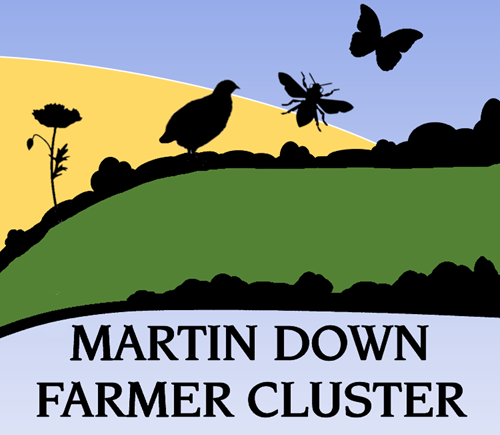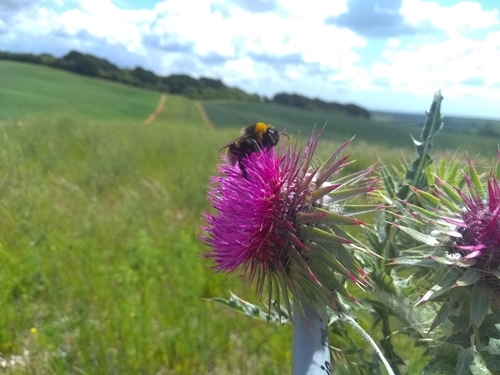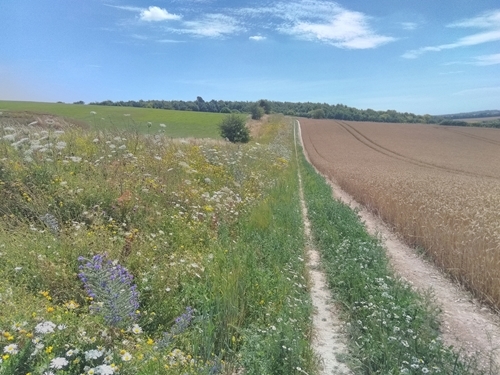
A pioneering group of farmers on the Hampshire/Dorset border has had their conservation efforts recognised by Defra with a ‘Bees’ Needs Award’ in the Farming category. Since 2016 the twelve farmers in the Martin Down Farmer Cluster*, facilitated by Jess Brooks of the Game & Wildlife Conservation Trust, have created 80 hectares of new habitats for pollinators and other farmland wildlife, across 5,000 hectares of Dorset and Hampshire.
“I am so delighted that the efforts and commitment of the Martin Down farmers have been recognised with a Bees’ Needs Award,” said Jess Brooks. “I congratulate every one of them because they have all done something for pollinators on their farms, whether through stewardship schemes or from their own pockets.”
The new habitat represents a 50% increase in pollinator habitat and includes arable reversions, wildflower margins and grass margins, many of which have been sited to link up Sites of Special Scientific Interest (SSSIs). The farmers have also installed new pools and puddles, butterfly banks and 6km of new hedgerows. One of their proudest achievements is the creation of multiple new breeding sites for rare small blue butterflies.

Guided by the GWCT, regular monitoring is carried out across the farmer cluster, including 16 ‘BeeWalks’ twice a year in May and August. This enables them to keep track of the number of different species and the size of populations. “The monitoring is a brilliant catalyst for our conservation work,” said Jess. “The data is fed back to the farmers to enable them to see the effects of their conservation efforts and make better-informed decisions about land management.”
The farmer cluster received the award at an online ceremony hosted by Defra on 19 November. Chairman of the Martin Down Farmer Cluster, Tim Palmer, said, “I am delighted to be able to accept this Defra Bees’ Needs Award in the farming category on behalf of the Martin Down farmer cluster. We have been involved with Bees’ Needs for several years now and this is a fantastic recognition of our efforts.
“2020 has been a particularly good year for pollinators. We have seen any number of bees of all sorts of species including, on my farm, an enormous colony of ivy bees which I have not see before. Watching the results of our efforts is particularly gratifying and exciting.”

The farmer cluster provides training to educate and engage local landowners. They also involve the local community in the project, recruiting volunteers to help with monitoring, running talks, farm walks and workshops on topics such as the importance of pollinators (attended by other farmers and the public) to showcase their work.
The Martin Down Farmer Cluster (Twitter @MDSuperCluster) has produced a short video about their work for pollinators, available to view here.
Notes to editors
*Farmer clustershttps://www.farmerclusters.com/ – Farmers and land managers do a lot for Britain’s rural environment, but there is only so much that an individual can achieve on their own. The GWCT recognised that by working together in a ‘cluster’, helped by an advisor or ‘facilitator’, farmers and land managers could work more cohesively together, share resources and make a greater impact. The GWCT supported the establishment of the first farmer-led conservation group in the Marlborough Downs in 2012, followed in 2014 by farmer cluster pilots in partnership with Natural England. There are now over 150 cluster-type groups around the country. These enable land managers to collectively deliver greater benefits for soil, water and wildlife at a landscape scale.
Defra Bees' Needs Awards
The Bees’ Needs Awards – Farming Category, now in their second year, recognise and celebrate the fantastic work of farmers in protecting and enhancing the habitat of bees. Hosted by Defra and the Bee Farmers' Association as a virtual award ceremony on Thursday 19 November, the Bees’ Needs Awards 2020 saw winners from across the country come together to receive their awards through an online event showcasing examples of great initiatives community groups, local councils, charitable organisations and inspirational farmers. The Bees’ Needs Awards are run on behalf of Defra by the Bumblebee Conservation Trust https://www.bumblebeeconservation.org/bees-needs/